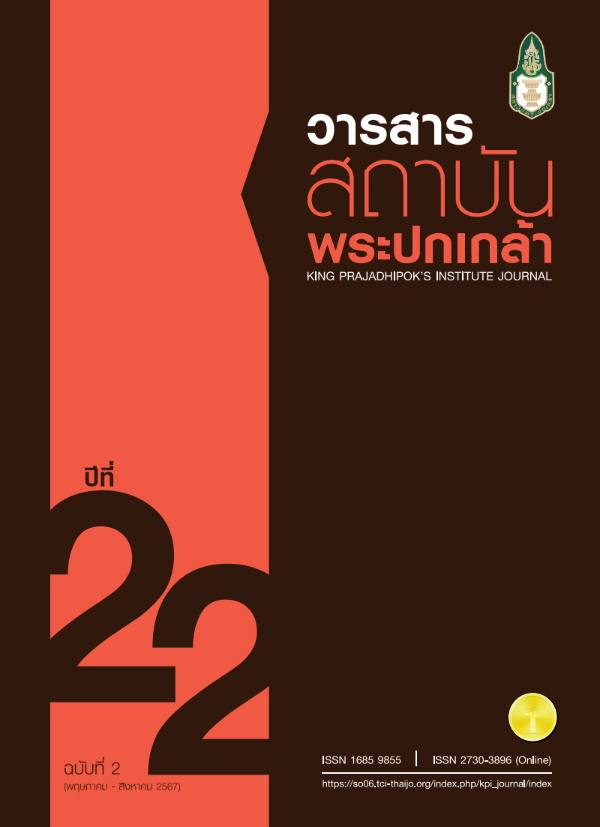Environmental Democratic Rights and Sustainable Development: Concept, Practices, and International Lessons
Main Article Content
Abstract
This article aims to disseminate knowledge about environmental democratic rights and sustainable development. It focuses on explaining: (1) the concept, background, and significant principles of environmental democratic rights, which are integrated from Political Science, Public Administration, Law, and Ecology; (2) the practice of environmental democratic rights as a guideline for sustainable development; and (3) lessons learned from implementing environmental democratic rights in various countries, including both successful and unsuccessful cases. This article also highlights the importance of environmental democratic rights, especially for groups negatively affected by environmental decisions, in enhancing public participation in decision-making processes related to public policy and project development. It includes recommendations for the development of democratic rights and environmental protections in Thailand to promote sustainable development. These recommendations emphasize improving related policies and laws, conducting Environmental Impact Assessments, and developing a joint decision-making model between the public sector and the people, in accordance with the principles of environmental democratic rights.
Article Details

This work is licensed under a Creative Commons Attribution-NonCommercial-NoDerivatives 4.0 International License.
@ 2020 King Prajadhipok's Institute The Government Complex Commemorating All Right Reserved.
References
ภาษาไทย
ถวิลวดี บุรีกุล. (2552). พลวัตการมีส่วนร่วมของประชาชน: จากอดีตจนถึงรัฐธรรมนูญแห่งราชอาณาจักรไทย พุทธศักราช 2550. กรุงเทพฯ: บริษัท เอ.พี. กราฟิค ดีไซด์และการพิมพ์ จำกัด.
บูชิตา สังข์แก้ว. (2559). การกระจายอำนาจตัดสินใจในโครงการภาครัฐกับสิทธิกลุ่มผู้รับผลกระทบทางลบ: ทฤษฎี บทเรียน และการพัฒนา. วารสารผู้ตรวจการแผ่นดิน, 9(2), 38-73.
บูชิตา สังข์แก้ว. (2564). หลักนิติธรรมกับการคุ้มครองสิทธิของประชาชนผู้รับผลกระทบจากนโยบายรัฐ. วารสารผู้ตรวจการแผ่นดิน, 14(1), 87-123.
บูชิตา สังข์แก้ว. (2565). มองประชาธิปไตยสิ่งแวดล้อมสากล แล้วย้อนดูไทย. สืบค้นจาก https://greennews.agency/?p=28542
ปวริศร เลิศธรรมเทวี. (2559). สิทธิด้านสิ่งแวดล้อมกับรัฐธรรมนูญ. กรุงเทพฯ: นิติธรรม.
ภาษาอังกฤษ
Coulibaly-Lingan, P., Savadogo, P., Tigabu, M. & Oden, P. (2011). Factors Influencing People’s Participation in The Forest Management Program in Burkina Faso, West Africa. Forest Policy and Economics, 19(1), 292-302.
Garcia, C. (2021). Governance and Environmental Democracy. San Salvador: Friedrich Ebert Stiftung.
Hashim, R., Ristak, N.D.M & Laili, N. (2016). Attitudes toward Environmental Democracy among Urban Communities. Environment-Behaviour Proceedings Journal, 1(3), 33-42. doi: 10.21834/e-bpj.v1i3.346
Hoogstra-Klein, M.A., Permadi, D.B. & Yasmi, Y. (2012). The Value of Cultural Theory for Participatory Processes in Natural Resources Management. Forest Policy and Economics, 20(1), 99-106.
Iwinska, W., Kampas, A. & Longhurst, K. (2019). International between Democracy and Environmental Quality: Toward a More Nuanced Understanding. Sustainability, 11(1728), 1-17. doi:10.3390/su11061728
Parola, G. (2013). Environmental Democracy at the Global Level: Rights and Duties for a New Citizenship. De Gruyter Open Poland. Retrieved from https://doi.org/10.2478.9788376560144
Pickering. J., Backstrand, K. & Schlosberg, D. (2019). Between Environmental and Ecological Democracy: Theory and Practice at the Environmental Democracy Nexus. Journal of Environmental Policy & Planning, 22(1), 1-15.
The Access Initiative. (2018). Environmental Democracy. Brussels: The European Commission. The Environment-People-Law. (2021). Environmental Democracy Index: An Updated Score for Ukraine. Retrieved from http://epl.org.ua/en/about-us-posts
World Resources Institute. (2008). Voice and Choice: Opening the Door to Environmental Democracy. Washington D.C.: World Resources Institute.
World Resources Institute. (2015). The Environmental Democracy Index. Washington D.C.: World Resources Institute.


